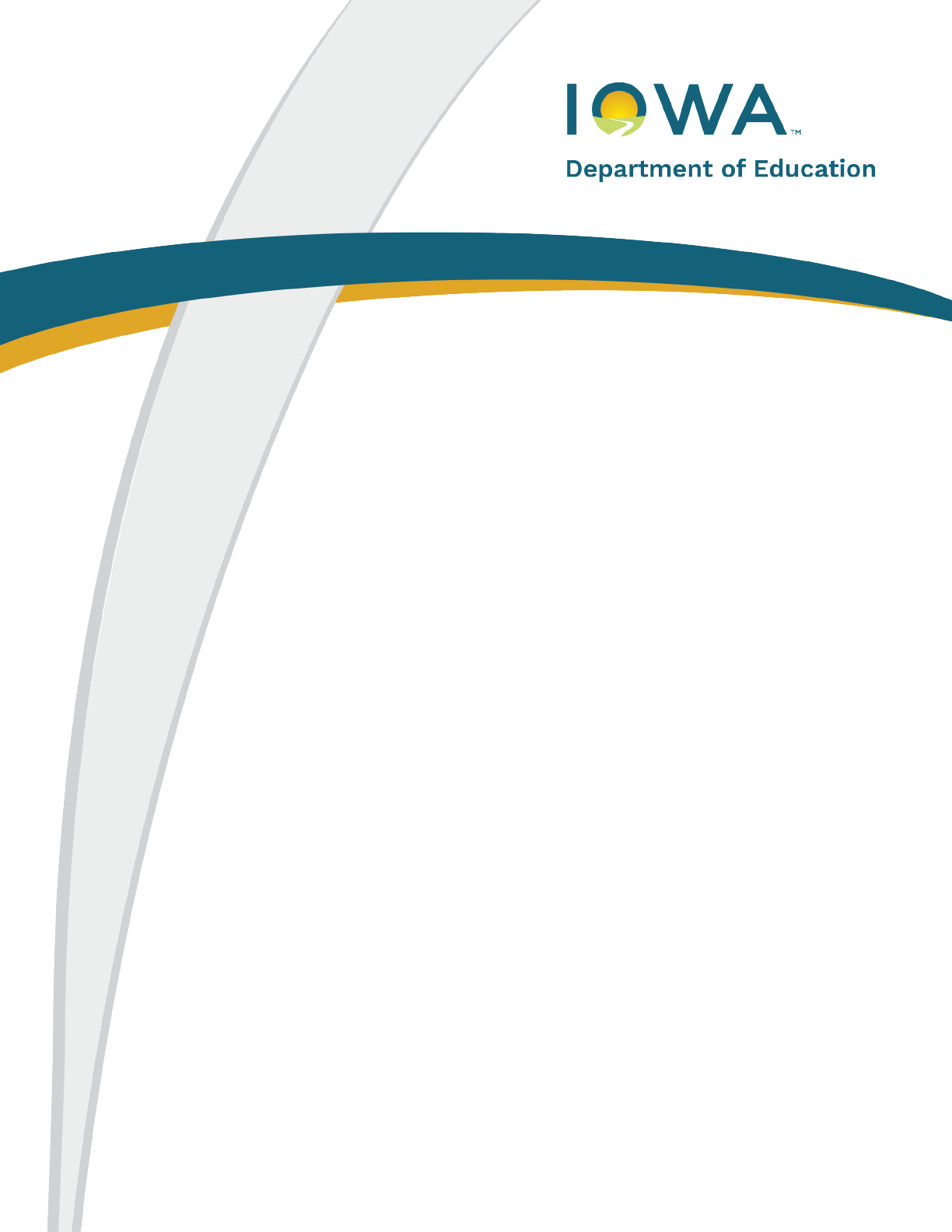
Iowa School Counseling
Framework
May 2024

2
Iowa School Counseling Framework
Prepared by
Aimee Hospodarsky
Grant Wood AEA
School Counselor Consultant
4401 6th Street SW
Cedar Rapids, IA 52404
Phone: 319-399-6816
www.gwaea.org
Scotti Hagensick
Keystone AEA
School Improvement Facilitator
1400 2nd St NW
Elkader, IA 52043
Phone: 563-245-1480 ext. 1220
www.keystoneaea.org
Sue Schirmer
Heartland AEA
Professional Learning and Leadership Consultant
6500 Corporate Drive
Johnston IA 50131
Phone: 515-383-5006
www.heartlandaea.org
Erica Woods-Schmitz
Iowa Department of Education
Division of Community Colleges and Workforce Preparation
Grimes State Office Building
400 E 14th Street
Des Moines, IA 50319-0146
Phone: 515-330-0185
erica.woods-[email protected]
educate.iowa.gov
Acknowledgement
Special Thanks to The American School Counseling Association (ASCA) The ASCA National Model®
and the ASCA National Model diagram are registered trademarks of the American School Counselor
Association. Used with permission.
Additional thanks extended to Hatching Results and SC4MTSS; resources used with permission.

3
Iowa School Counseling Framework
Contents
Introduction ............................................................................................................................................ 4
How to Use the Framework ................................................................................................................ 4
What are the Benefits of a Comprehensive School Counseling Program? ......................................... 4
The School Counselor in Iowa ............................................................................................................... 5
How has History Shaped School Counseling?.................................................................................... 5
Does Title Matter? School Counselor v. Guidance Counselor ............................................................ 5
Iowa Code: School Counseling Administrative Rules ......................................................................... 6
Standards for School Counseling Programs ....................................................................................... 6
Iowa Code: Individual Career and Academic Plan .............................................................................. 7
ICAP Requirements: ....................................................................................................................... 7
ICAP Five Essential Component Requirements: ............................................................................. 7
District Career and Academic Plan (DCAP) .................................................................................... 8
Additional Career and Academic Planning Guidance and Information ............................................ 8
The Professional School Counselor ....................................................................................................... 9
How do I Become a School Counselor in Iowa? ................................................................................. 9
Exceptions to the above rules. ........................................................................................................ 9
Current School Counseling Programs in Iowa ............................................................................... 10
What is the Role of the School Counselor? ...................................................................................... 10
What Are the Ethical Responsibilities of a School Counselor? ......................................................... 10
What are the School Counselor Standards and Competencies? ...................................................... 10
How is the Role of the School Counselor Similar to Other Education Professionals? ....................... 11
The School Counseling Program ......................................................................................................... 11
What is a Comprehensive School Counseling Program? ................................................................. 11
What is the ASCA National Model? .................................................................................................. 12
The 4 Components of the ASCA National Model .............................................................................. 13
Define ........................................................................................................................................... 13
Manage ........................................................................................................................................ 13
Deliver .......................................................................................................................................... 14
Assess .......................................................................................................................................... 14
Additional Information on the ASCA National Model ..................................................................... 14
Examples of the ASCA Themes in Action by ASCA National Model Components ............................... 16
How Does a School Counseling Program Connect to a Multi-Tiered System of Supports (MTSS)? ..... 18
How is the ASCA Model Implemented? ............................................................................................... 19
What is RAMP? ................................................................................................................................ 19

4
Iowa School Counseling Framework
Introduction
The Iowa School Counseling Framework provides a model to guide and assist Iowa’s school
counselors in the implementation of a comprehensive school counseling program. Based upon the
American School Counselor Association (ASCA) National Model, 4th Edition, the Iowa Framework is a
model considered best practice for the profession. “School counseling program” means an articulated,
sequential K
-‐12
program that is comprehensive in scope, preventive in design, developmental in
nature, driven by data, and integral to the school district’s curricula and instructional program. The
framework initially was launched following 2007 legislation that set standards for school counseling
programs in Iowa and required at least one licensed school counselor for each school district with the
expectation that districts will move towards one school counselor for every 350 students.
How to Use the Framework
This framework is designed to support school counseling programs that are rooted in accountability and
success for each student. It can be used by school counselors, administrators, students, families and
stakeholders that support school counseling including but not limited to school boards and community
members. Please see the table of contents to navigate to topics of particular interest.
For additional questions or inquiries outside of the scope of this framework, please consult with your
AEA School Counselor contact or to the Iowa Department of Education’s school counseling contact
.
What are the Benefits of a Comprehensive School Counseling Program?
Numerous research studies
1
have quantified the impact of school counselors on student development
and success, as well as on school climate and K–12 education in general. The ASCA grants program
has funded several studies measuring school counselors’ impact on student outcomes, including the
effect of student-to-school-counselor ratios. Other studies, published in
Professional School Counseling
and throughout other literature sources support the role of school counselors in student success,
including improved ACT and SAT scores, higher rates of informed postsecondary decision-making,
fewer disciplinary actions, improved attendance and more.
ASCA combined a number of recent journal articles examining the impact of school counselors and
school counseling programs on K-12 student outcomes into a single collection titled, “
Empirical
Research Studies Supporting the Value of School Counseling
2
.” All of the articles are data centered
and drawn from national peer-reviewed journals and research reports. These articles support the value
of school counseling within the three ASCA Domains and the impact upon students, school districts,
and communities.
1
“Impact of School Counseling. “Impact of School Counseling - American School Counselor Association (ASCA),
American School Counselor Association,
https://www.schoolcounselor.org/Publications-
Research/Research/Impact-of-School-Counseling.
2
Empirical Research Studies Supporting the Value of School Counseling, American School Counseling
Association, https://www.schoolcounselor.org/getmedia/7d00dcff-40a6-4316-ab6c-8f3ffd7941c2/Effectiveness.pdf

5
Iowa School Counseling Framework
The School Counselor in Iowa
Through work within the three domains of ASCA, school counselors in Iowa, outlined under Iowa Code,
have a long history of supporting students, districts and families.
How has History Shaped School Counseling?
3
The early history of school counseling was shaped by the need to assist students with movement
toward high school graduation and into a career or “vocation. The “guidance counselor” emerged to
provide additional support to assist the transition into the world of work. From this initial focus of
“vocational guidance” over 100 years ago, the role and function of the school counselor has adapted
and changed into a comprehensive model of support for all students with a wider lens.
With international conflict and society changes in the 1940s and 1950s as well as passage of legislation
targeting funding for vocational and higher education, the role of the school counselor began to grow
outside of the single “vocational” focus. With the establishment of the American School Counseling
Association (ASCA) in 1952, the further expansion of the role of the school counselor continued.
Over the next several decades, with continued international conflict, economic shifts, changes in
education, early school counseling pioneers and work in a handful of states, the training to become a
school counselor became more structured and broadened towards a comprehensive and planned
model within the educational setting. This expansion included implementation of career development
programs and delivery systems as well as considerations surrounding supporting academics.
Fast forward to the end of the 20th Century, several pieces of legislation including the Carl D. Perkins
Technical Act Amendments, which included the shift to define “Career Guidance and Academic
Counseling,” were passed and continued to expand the role of the school counselor. With the continued
changes, the term “guidance counselor” no longer provided an accurate description of the broader role
of the school counselor. In 1990, ASCA issued an official statement recommending the use of “school
counselor;” signaling a move towards understanding the full focus of the school counselor outside of
just “vocational education.”
As the 20th Century ended and the 21st Century began, ASCA published the first ASCA Model further
shaping the delivery model, role of the school counselor within the school and the proactive, data-
driven approach to supporting students. The model has been revised and adapted three more times
since the introduction in 2003 with the latest edition released in 2019.
Does Title Matter? School Counselor v. Guidance Counselor
While historically, the school counselor was focused on “vocational guidance,” giving past merit to the
title “guidance counselor,” expansion of the role of the school counselor warrants the updated title.
From the reactive and limited connection of a guidance counselor, Iowa’s school counselors are a
proactive, data-driven and an integrated part of the school improvement process. ASCA research
suggests that the title used influences the perception of the school counselor and impacts views related
to competency and scope of work; the research is captured in an infographic titled, “Guidance
Counselors or School Counselors: How the name of the Profession Influences Perceptions of
Competence.” While guidance counselor remains the language within some Iowa code language, the
updated title of school counselor better reflects the full scope of the school counselor's duties, and thus
3
Historical information adapted from: American School Counselor Association, “Embrace the Past, Welcome the
Future: A Brief History of School Counseling” and “School Counseling Principles: Remembering the Past,
Shaping the Future.”
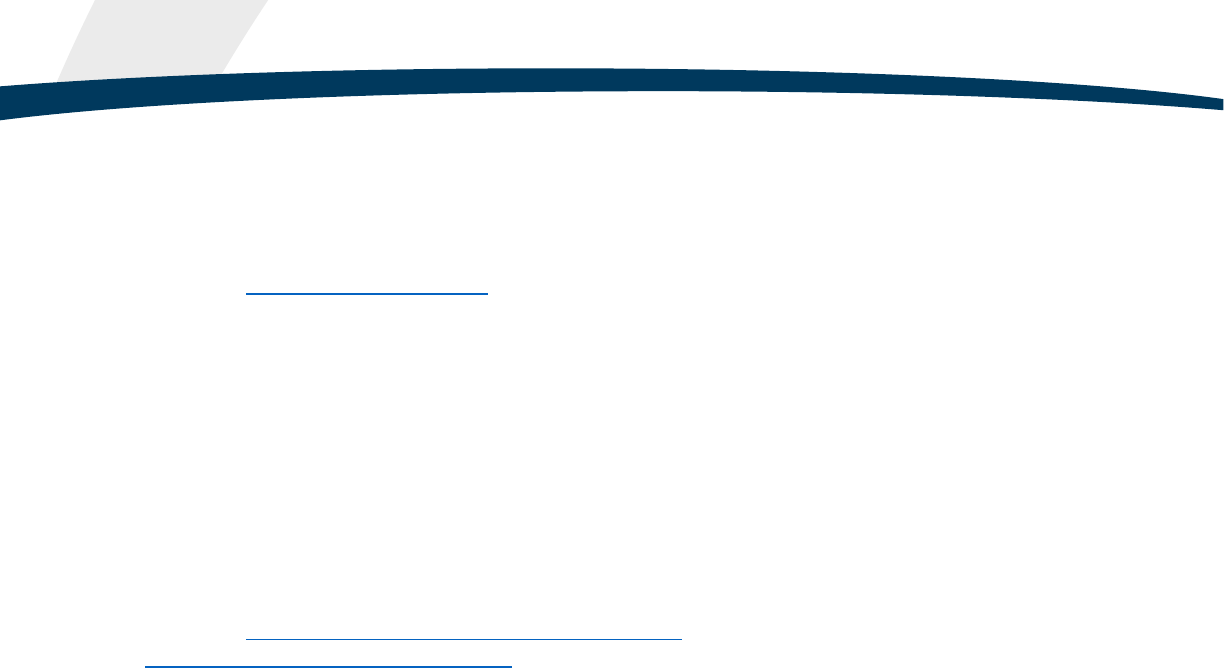
6
Iowa School Counseling Framework
is a more accurate term and title. For a side-by-side comparison of the school counselor and guidance
counselor role, ASCA Guidance Counselor vs. School Counselor provides a clear overview of the
distinction.
Iowa Code: School Counseling Administrative Rules
As outlined in Iowa Administrative Rule, beginning July 1, 2007, each school district shall have a
qualified guidance counselor who shall be licensed by the board of educational examiners under
chapter 272. Each school district shall work toward the goal of having one qualified guidance counselor
for every three hundred fifty students enrolled in the school district.
The state board shall establish in rule a definition of and standards for an articulated sequential
kindergarten through grade twelve guidance and counseling program. The program shall be designed
to ensure that the guidance counselor can work collaboratively with students, teachers, support staff,
and administrators to support the curricular goals of the school by offering responsive services that
address the growth and development needs of students and the attainment of student competencies in
academic, career, and social areas (updated to reflect March 2023 revision).
Standards for School Counseling Programs
As outlined in Iowa Administrative Code 281-12.3(11)(a)(b), A qualified school counselor, licensed by
the Iowa Board of Educational Examiners, who works collaboratively with students, teachers, support
staff and administrators shall direct the program and provide services and provide services and
instruction in support of the curricular goals of each attendance center. The school counselor shall be
the member of the attendance center instructional team with special expertise in identifying resources
and technologies to support teaching and learning. The school counselor and classroom teachers shall
collaborate to develop, teach, and evaluate attendance center curricular goals.
The program shall be regularly reviewed and revised and shall be designed to provide all of the
following:
1. Curriculum that is embedded throughout the district’s overall curriculum and is systemically
delivered by the school counselor in collaboration with instructional staff through classroom and
group activities, and that consists of structured lessons to help students achieve desired
competencies and to provide all students with the knowledge and skills appropriate for their
developmental levels;
2. Individual student planning through ongoing systemic activities designed to help students
establish educational and career goals to develop future plans;
3. Responsive services through intervention and curriculum meeting students’ immediate and
future needs as occasioned by events and conditions in students’ lives and that may require any
of the following: individual or group counseling, consultation with parents, teachers, and other
educators, referrals to other school support services or community resources, peer helping, and
information; and
4. Systemic support through management activities establishing, maintaining, and enhancing the
total school counseling program, including professional development, consultation,
collaboration, program management, and operations.

7
Iowa School Counseling Framework
Iowa Code: Individual Career and Academic Plan
Beginning in 2016 and updated in 2022, the Individual Career and Academic Plan (ICAP) requires each
school district to ensure each student reviews and revises an individualized career and academic plan
each year beginning in 8th grade and continuing until graduation. ICAP, as outlined in HF 2392
, is a
series of high-quality career-related activities and experiences that provide a platform for students to
engage in the development of self-reflection, career research and exploration of postsecondary
opportunities and apply and align their learning with their personal path and goals. While ICAP is not
the sole responsibility of the school counselor, the school counselor’s role and training within the
academic
4
and career domain
5
of the ASCA National Model and outlined in the ASCA student
standards
6
, provides a foundation of support for development and implementation of a quality student
ICAP process.
ICAP Requirements:
The plan shall, at a minimum, achieve all of the following:
a. Prepare the student for successful completion of the core curriculum developed by the state
board of education pursuant to Iowa Administrative Code 281-12
by the time the student
graduates from high school.
b. Identify the student’s postsecondary education and career options and goals.
c. Identify the coursework and work-based learning needed in grades 9 through 12 to support the
student’s postsecondary education and career options and goals.
d. Prepare the student to successfully complete, prior to graduation and following a timeline
included in the plan, the essential components prescribed in rule 281—49.4(279).
e. Prior to graduation, advise the student how to successfully complete the Free Application for
Federal Student Aid.
Progress report. The school district shall report annually to each student enrolled in grades 9 through
12, and, if the student is under the age of 18, to each student’s parent or guardian, the student’s
progress toward meeting the goal of successfully completing the core curriculum and high school
graduation requirements adopted by the state board of education pursuant to 281—Chapter 12 and
toward achieving the goals of the student’s career and academic plan.
ICAP Five Essential Component Requirements:
The district shall engage each student in activities which support the following essential components:
1. Self-understanding: Students shall engage in developmentally appropriate inventories and
assessments that promote self-understanding, the connection to work, and engage in
meaningful reflective activities about the results.
2. Career information: Students shall research careers based on self-understanding results and
engage in meaningful reflection about the findings.
3. Career exploration: Students shall engage in activities that reveal connections among school-
based instruction, career clusters, and the world of work and engage in meaningful reflection.
4
“The School Counselor and Academic Development.” American School Counselor Association,
https://www.schoolcounselor.org/Standards-Positions/Position-Statements/ASCA-Position-Statements/The-
School-Counselor-and-Academic-Development. Adopted 2017, revised 2023.
5
“The School Counselor and Career Development.” American School Counselor Association,
www.schoolcounselor.org/Standards-Positions/Position-Statements/ASCA-Position-Statements/The-School-
Counselor-and-Career-Development. Adopted 2017, revised 2023.
6
American School Counselor Association. (2021). ASCA student standards: Mindsets & behaviors for student
success: K-12 college-, career- and life-readiness standards for every student.
https://schoolcounselor.org/getmedia/7428a787-a452-4abb-afec-d78ec77870cd/Mindsets-Behaviors.pdf

8
Iowa School Counseling Framework
4. Postsecondary exploration: Students shall engage in activities to explore relevant
postsecondary education and training options related to career interests and engage in
meaningful reflection on the exploration experience.
5. Career and postsecondary decision: Students shall complete relevant activities to meet their
postsecondary goals consistent with the plan and stated postsecondary intention.
District Career and Academic Plan (DCAP)
The school district shall develop a written career guidance plan that outlines the district implementation
of each student’s ICAP grade eight-12. As part of the required team, a school counselor must be
included.
The district plan shall include the following components:
a. The district shall, at a minimum, describe the following aspects of the district plan.
(1) The activities to be undertaken in each grade level to achieve the requirements of rule
281-49.3(279).
(2) Integration of the career guidance plan with the district’s comprehensive school
improvement plan and school guidance counseling program.
(3) At the district’s discretion, any additional outcomes to be integrated into the career
guidance system.
b. Designation of team. The superintendent of each school district shall designate a team of
education practitioners to carry out the duties assigned to the school district under this rule
(1) Team composition. The team shall include, but not be limited to, a school administrator,
a school counselor, teachers, including career and technical education teachers, and
individuals responsible for coordinating work-based learning activities.
(2) Duties. The team shall be responsible for the following:
i. Implementation of the district plan.
ii. Annually reviewing and, as necessary, proposing to the board of directors of the
school district revisions to the district plan
iii. Coordination of activities which integrate essential components into classroom
instruction and other facets of the school district’s educational program.
iv. Regularly consulting with representatives of employers, state and local workforce
systems and centers, higher education institutions, and postsecondary training
programs to ensure activities are relevant and align with the labor and workforce
needs of the region and state.
Career information and decision-making systems
Each district shall use a career information and decision-making system that meets the minimum
requirements established in Iowa Administrative Code 281-49.6(3)
.
Compliance
The director shall monitor school districts for compliance with the provisions of this chapter through the
accreditation process established for school districts under Iowa Administrative Code 281-12
.
Additional Career and Academic Planning Guidance and Information
Career and Academic Planning Overview
Individual Career and Academic Planning (ICAP) Guidance
ICAP: Addition of Free Application for Federal Student Aid (FAFSA) Guidance
ICAP: Addition of Work-Based Learning Guidance

9
Iowa School Counseling Framework
The Professional School Counselor
School counselors are highly educated, professionally certified individuals who help students succeed
in school and plan their career. An integral part of the total education system, school counselors help
students form healthy goals, mindsets and behaviors. With the aid of a school counselor, students learn
to develop effective collaboration and cooperation skills, to practice perseverance, to develop time
management and study skills, and to learn self-motivation and self-direction habits. (
ASCA outlined
counselor roles and responsibilities).
How do I Become a School Counselor in Iowa?
The Iowa Board of Educational Examiners is the body that issues initial licensure as well as renewal of
licenses. There are two ways to earn a license in Iowa:
1. As an endorsement on a currently held Iowa Teaching License - it is strongly encouraged
that applicants earn a Master’s Degree in School Counseling; however, if the applicant holds a
master’s in the field of education, the applicant can complete coursework and evidence that
coursework and experiences on the checklists below for consideration:
a. K-8 Professional School Counselor
b. 5-12 Professional School Counselor
2. Through a Professional Service License (not currently a teacher) - the applicant must have
a master’s degree and complete all coursework and experiences through an accredited school
counseling program. The applicant then applies for an Initial Professional Service License
that is
valid for two years. At the end of the two years (or three in a non-public/non-Iowa school), the
applicant can apply to convert to a
Professional Service License.
Renewal credits are required for individuals with the Professional Service License or Master Educator
license. The school counselor must have four renewal credits
each renewal period (five years).
Renewal credits are not required for those on Initial licenses or with a master’s degree and have at
least 10 years of experience.
Through a Professional Service License (not currently a teacher), the applicant must have a master’s
degree in school counseling. The applicant then applies for an Initial Professional Service License that
is valid for two years. At the end of the two years, the applicant can apply for a Professional Service
License.
Exceptions to the above rules.
a. Class B License - can be granted for those who have completed half the coursework as a
school counselor. Holding an Iowa teaching license is required.
b. Executive Director Decision - can be granted for those with less than half the coursework as a
school counselor completed. They will have one school year to complete half the coursework,
then apply for a Class B for two additional years to complete the remainder of the program.
Holding an Iowa Teaching license is required.
c. Class G License - can be granted for those who have completed 75% of their coursework and
experiences as a school counselor.

10
Iowa School Counseling Framework
Current School Counseling Programs in Iowa
7
Buena Vista
Drake University
Grand View University
Loras College
Northwestern College
University of Iowa
University of Northern Iowa
Upper Iowa University
What is the Role of the School Counselor?
The ASCA resource, “The Role of the School Counselor” provides a quality overview aimed providing
an context to best understand the many varied ways school counselors support students. A further
ASCA resource, “
Who Are School Counselors Infographic” (also available in Spanish) further clarifies
the school counselor role.
For more information, review the various ASCA provided documents regarding specific roles of school
counselors:
• The Essential Role of Elementary School Counselors
• The Essential Role of Middle School Counselors
• The Essential Role of High School Counselors
• The Essential Role of School Counselor Educators
• The Essential Role of School Counseling Directors/Coordinators
In 2019, EdTrust put together the white paper, “School Counselors Matter.” This paper outlines the
critical need for school counselors, especially for underserved students.
Appropriate and Inappropriate Duties is an additional resource from ASCA to inform all stakeholders on
what school counselors could and should be doing. While the school counselor role is designed to
support all students, including support for the entire school, counselors can best use their time and
skills most effectively when appropriate duties are utilized.
What Are the Ethical Responsibilities of a School Counselor?
School counselors face ethical challenges every day. Whether the counselor is new to the field or has
years of experience, ethical challenges will still arise. From confidentiality issues to records
maintenance, from duty of care to sexual harassment issues, a school counselor's ethical questions
can spring up from every corner. ASCA provides a number of resources and services to help
counselors meet these legal and ethical challenges as comprehensively as possible. (ASCA)
The ASCA Ethical Standards for School Counselors
are the basis of ASCA's ethical program. ASCA
also has Ethical Standards for School Counselor Education Faculty.
The association also publishes books and journal articles on legal and ethical issues, as well as
addressing them in the members-only ASCA Scene. Each issue of ASCA School Counselor magazine
contains an article written by the chair of ASCA's Ethics Committee about a legal or ethical issue.
What are the School Counselor Standards and Competencies?
The ASCA School Counselor Professional Standards & Competencies outline the mindsets and
behaviors school counselors need to meet the rigorous demands of the school counseling profession
and the needs of pre-K–12 students. These standards and competencies help ensure new and
7
Any updates or changes to the list of approved school counseling programs in Iowa will be reflected on the Iowa
Department of Education school counseling website.
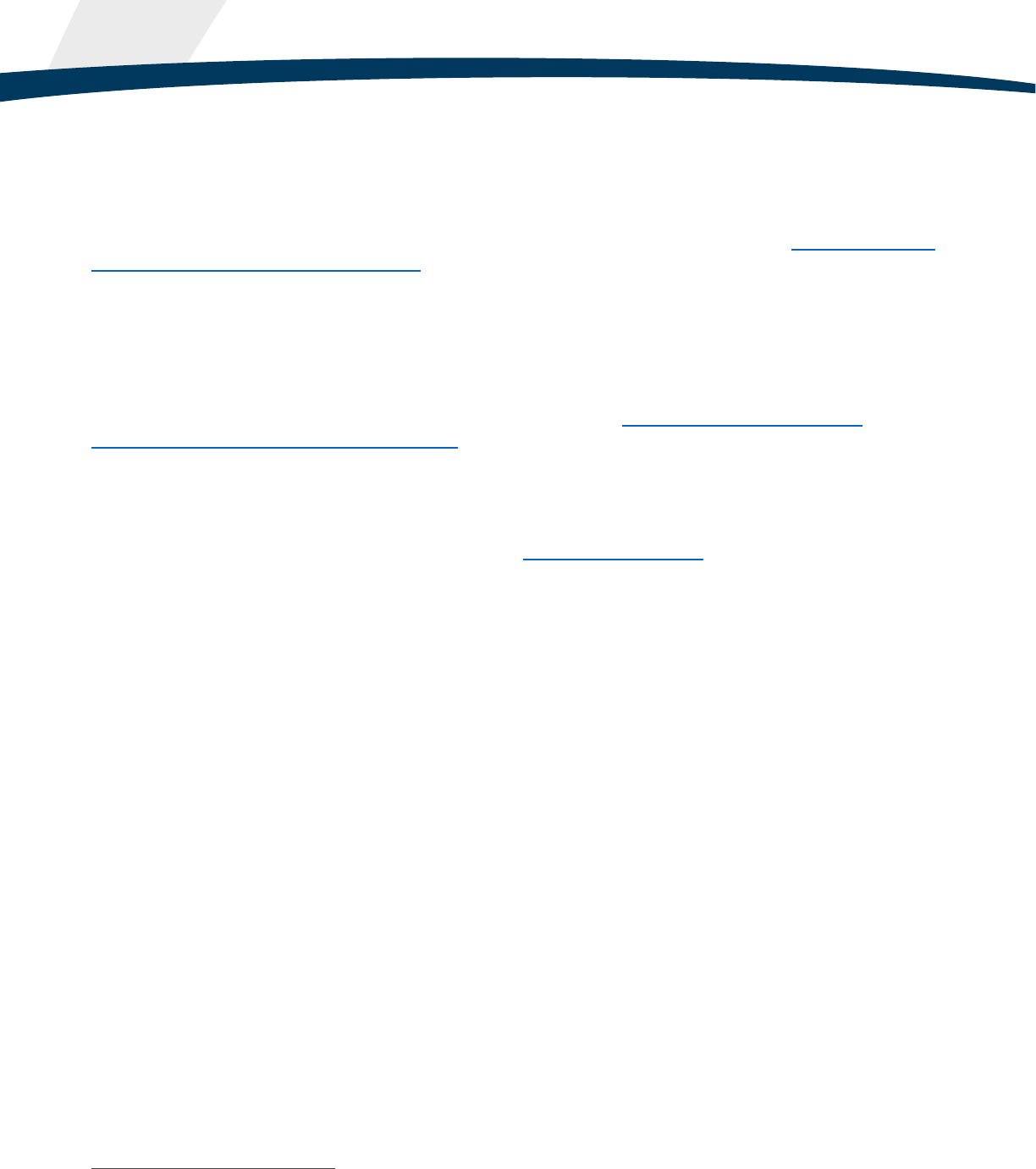
11
Iowa School Counseling Framework
experienced school counselors are equipped to establish, maintain and enhance a school counseling
program addressing the ASCA domain areas.
How is the Role of the School Counselor Similar to Other Education
Professionals?
School counselors work in partnership with many other education professionals. The overview of types
of counseling/therapy services available provides a high-level view of some of those professionals, the
services provided, the scope of services provided, the referral process and the funding streams
currently available.
The School Counseling Program
School counselors design and deliver school counseling programs that improve student outcomes. The
American School Counselor Association (ASCA) has published “
The ASCA National Model: A
Framework for School Counseling Programs” which outlines the components of a school counseling
program which is aligned with the school or district's mission and vision and is intended to positively
impact students and close gaps in the areas of achievement, attendance, and discipline.
What is a Comprehensive School Counseling Program?
The school counseling program, as described in the ASCA National Model, is comprehensive in scope,
preventive in design and developmental in nature and is an integral component of the school’s mission.
Informed by student data and based on the ASCA National Model, school counseling programs are
provided by a state-credentialed school counselor and:
• Are delivered to all students systematically
• Include a developmentally appropriate curriculum focused on the mindsets and behaviors all
student need for postsecondary readiness and success
• Close achievement and opportunity gaps
• Result in improved student achievement, attendance and discipline
According to Lapan (2012), “When highly trained, professional school counselors deliver ASCA
National Model comprehensive school counseling program services, students receive measurable
benefit.”
8
8
Lapan, R. (2012). Comprehensive school counseling programs: In some schools for some students
but not in all schools for all students. Professional School Counseling, 16(2), 84-88.
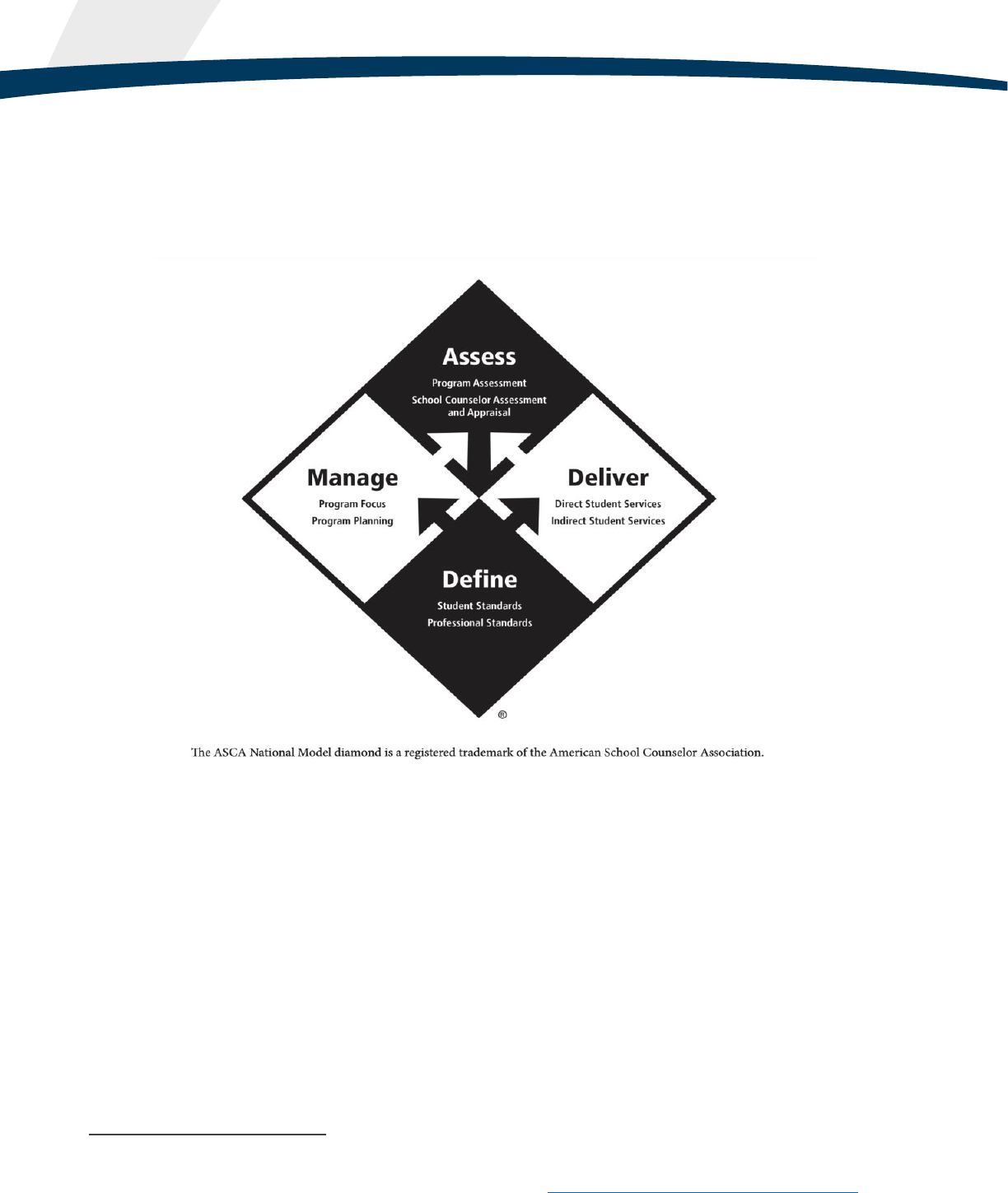
12
Iowa School Counseling Framework
What is the ASCA National Model?
“The ASCA National Model: A Framework for School Counseling Programs” outlines the components of
a school counseling program that is integral to the school’s academic mission and is created to have a
significant positive impact on student achievement, attendance and discipline.
It is comprised of four components: Define, Manage, Deliver, and Assess
9
:
9
The ASCA National Model® and the ASCA National Model diagram are registered trademarks of the American
School Counselor Association and can be fully reviewed in the ASCA National Model Executive Summary
. Used
with permission.
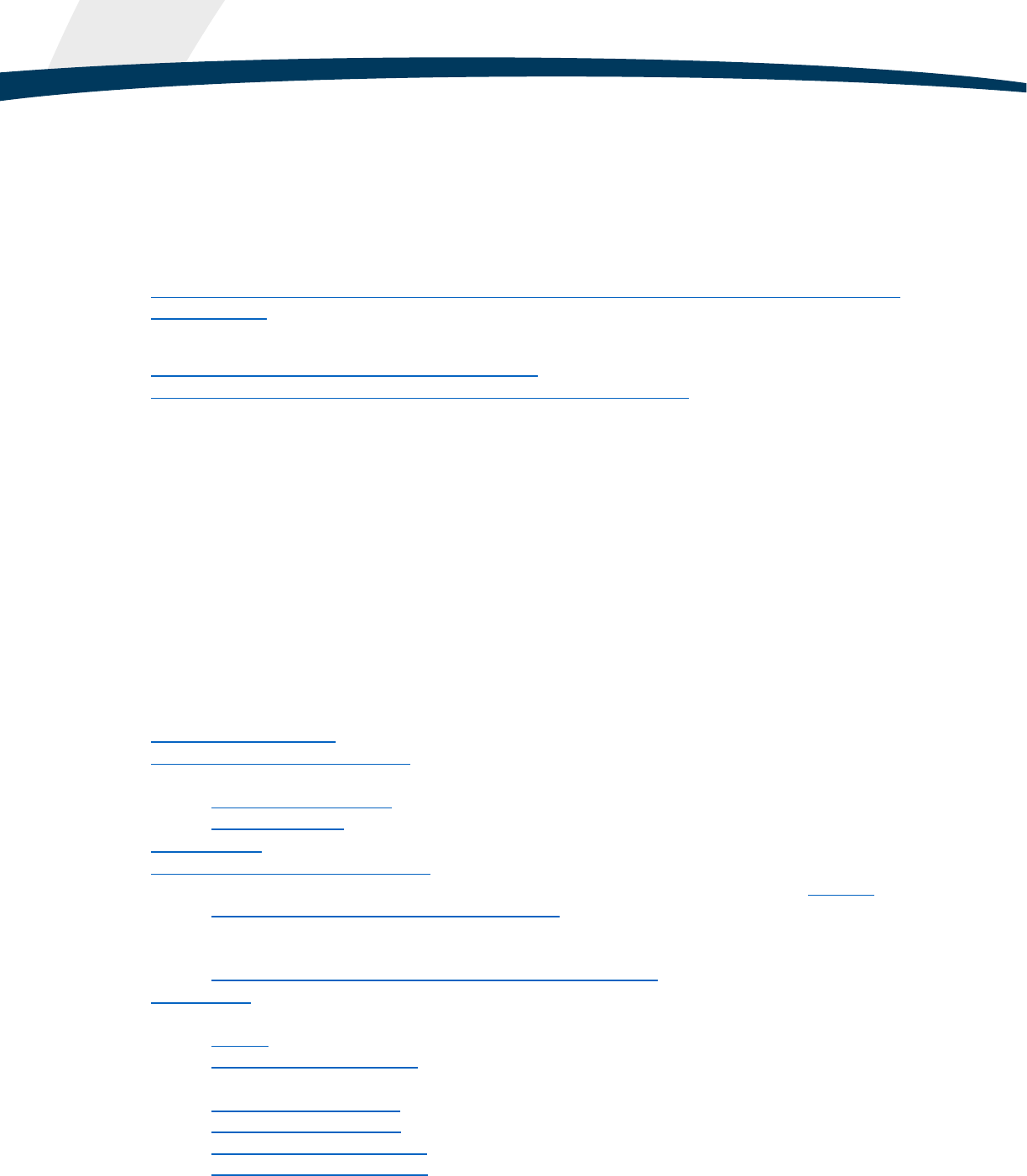
13
Iowa School Counseling Framework
The 4 Components of the ASCA National Model
Define
There are three sets of school counseling standards which define the school counseling profession.
Through these standards, both new and experienced school counselors are able to develop,
implement, and assess their school counseling program, which results in improved student outcomes.
Student Standards
• ASCA Mindsets & Behaviors for Student Success: K–12 College- and Career-Readiness for
Every Student
Professional Standards
• ASCA Ethical Standards for School Counselors
• ASCA School Counselor Professional Standards & Competencies
Manage
There are a number of components within the program focus and program planning areas that can
assist school counselors in managing their school counseling programs. Additional details and
examples of program focus elements can be found in the text, “The ASCA National Model: A
Framework for School Counseling Programs.”
Program Focus
• Beliefs
• Vision statement
• Mission statement
The templates below can help school counselors to design and implement more effective school
counseling programs, focused on student outcomes.
Program Planning
• School Data Summary
• Annual Student Outcome Goals
• Action Plans
o Classroom and Group
o Closing the Gap
• Lesson Plans
• Annual Administrative Conference
o Note: Iowa Board of Educational Examiners has approved the use of the adapted
Annual Administrator Conference template as the School Counselor Individual
Professional Development Plan (IPDP) for recertification purposes as long as it is
adapted to include the same elements required for the IPDP. Counselors can make a
copy of Iowa’s adapted administrative conference form for IPDP.
• Use of Time
• Calendars
o Annual
o Weekly/Use of Time Tool
• Advisory Council
o First Semester Agenda
o First Semester Minutes
o Second Semester Agenda
o Second Semester Minutes

14
Iowa School Counseling Framework
Deliver
Within this component, school counselors may be involved in direct student services with students or
indirect student services on behalf of students. Whether direct or indirect, the activities should be
developmentally appropriate and aligned with the ASCA Mindsets and Behaviors for Student Success.
The impact of direct and indirect student services can be measured through data related to student
achievement, attendance, and discipline. It is recommended that 80% or more of a school counselor’s
time be spent in Direct and Indirect Student Services.
Direct Student Services
• Instruction in the three domains of ASCA: Academic, Career and Social/Emotional Development
• Appraisal and advisement
• Counseling
Indirect Student Services
• Consultation
• Collaboration
• Referrals
Assess
It is best practice for school counselors to regularly assess their programs. This allows them to create
the best outcomes for students. In addition, self-evaluation is a part of that practice. There are a variety
of tools within this component to guide these activities. Through these tools, school counselors can
determine the effectiveness of their program, determine what improvements need to be made, and
gather information about how students are different as a result of the school counseling program.
Program Assessment
• School counseling program assessment
• Annual results report
o Classroom and Group Results Report
o Closing the Gap Action Plan and Results Report
School Counselor Assessment and Appraisal
• ASCA School Counselor Professional Standards & Competencies Assessment
• School Counselor Performance Appraisal
• Iowa School Counselor Evaluation Supplement
10
Additional Information on the ASCA National Model
What are the Themes of the ASCA National Model?
There are four themes
11
interwoven throughout the model:
• Advocacy
• Leadership
• Collaboration
• Systemic Change
10
Iowa Code requires the school counselor to be evaluated on the 8 teaching standards. However, the Iowa
School Counselor Evaluation Supplement crosswalks the standards with the
ASCA School Counselor
Professional Standards and Competencies and thus, is intended to support the administrator and the counselor
through the evaluation process. Additionally, it is designed to be a reflective tool to support individual professional
growth.
11
These areas are critical for school counselors to maximize positive outcomes for students.

15
Iowa School Counseling Framework
In addition to the four themes, ethics and equity have also been embedded within the ASCA National
Model, fourth edition.
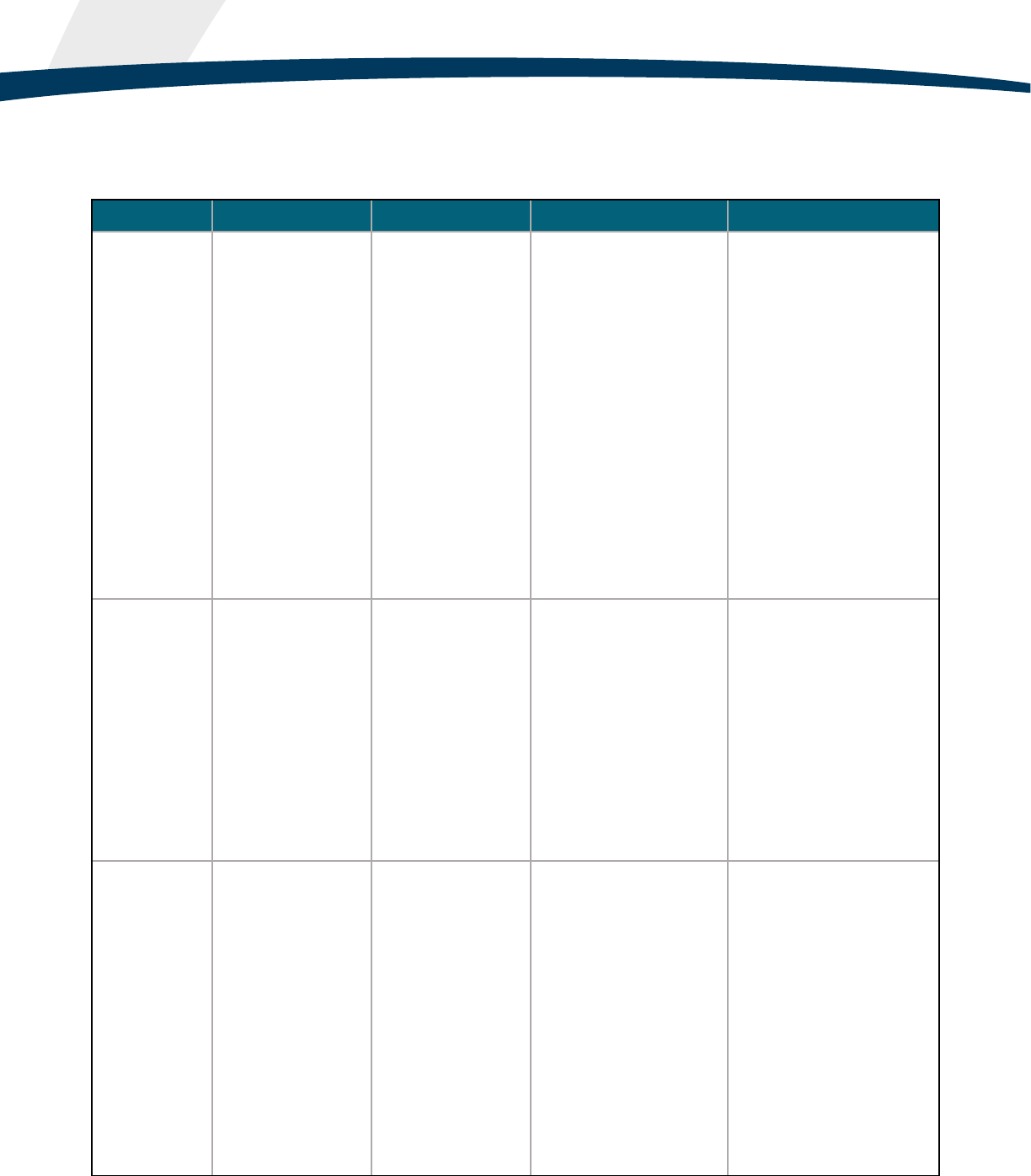
16
Iowa School Counseling Framework
Examples of the ASCA Themes in Action by ASCA
National Model Components
ASCA Theme
Define
Deliver
Manage
Assess
Advocacy
School counselors
advocate for the
highest form of
professionalism,
integrity, and
ethical behavior
and adhere to the
ASCA Ethical
Standards for
School Counselors.
School counselors
help stakeholders
understand the
school counselor's
role in supporting
the ASCA domain
areas in a school
setting. They also
provide clarity
between the school
counselor’s role
and other mental
health roles within a
continuum of care.
A vision statement
describes a future where
all students achieve
positive outcomes.
Data is used to advocate
both for student needs
and for the school
counseling program.
Program assessments
assist in the identification
of areas for improvement
and advocacy.
School counselors
advocate for appropriate
appraisal processes
aligned with ASCA School
Counselor Standards and
Competencies. Examples
include, the Iowa School
Counselor Evaluation
Supplement and the
Annual Administrative
Conference aligned with
Iowa Code.
Leadership
School counselors
serve as leaders to
identify needs and
validate what does
and does not
belong in a school
counseling
program. This
continuity of service
is clear and
understandable to
all stakeholders.
The ASCA
Mindsets and
Behaviors for
Student Success
inform the
comprehensive
school counseling
program in an
intentional,
thoughtful way.
Having a vision and
mission allows for
collaborative work
toward a shared purpose
and goals and aligns the
school counseling
program with the
school/district vision and
mission.
School counselors
demonstrate a
commitment to leadership
and continuous
improvement by
continually assessing the
program and identifying
areas for growth.
Collaboration
In order to support
all students in
attaining the ASCA
Student Standards,
school counselors
collaborate with
families, educators,
businesses and
community
organizations.
School counselors
consult with other
school counselors
as well as
education,
counseling, and
legal professionals
when ethical and/or
legal questions
arise.
School counselors
collaborate with a variety
of stakeholders to
access, collect, and
review data and align
student outcome goals
with that data.
Collaboration is also
required to access
supplemental
information which can
help school counselors
understand issues in
context.
School counselors
collaborate with
stakeholders to accurately
assess their programs and
analyze results.
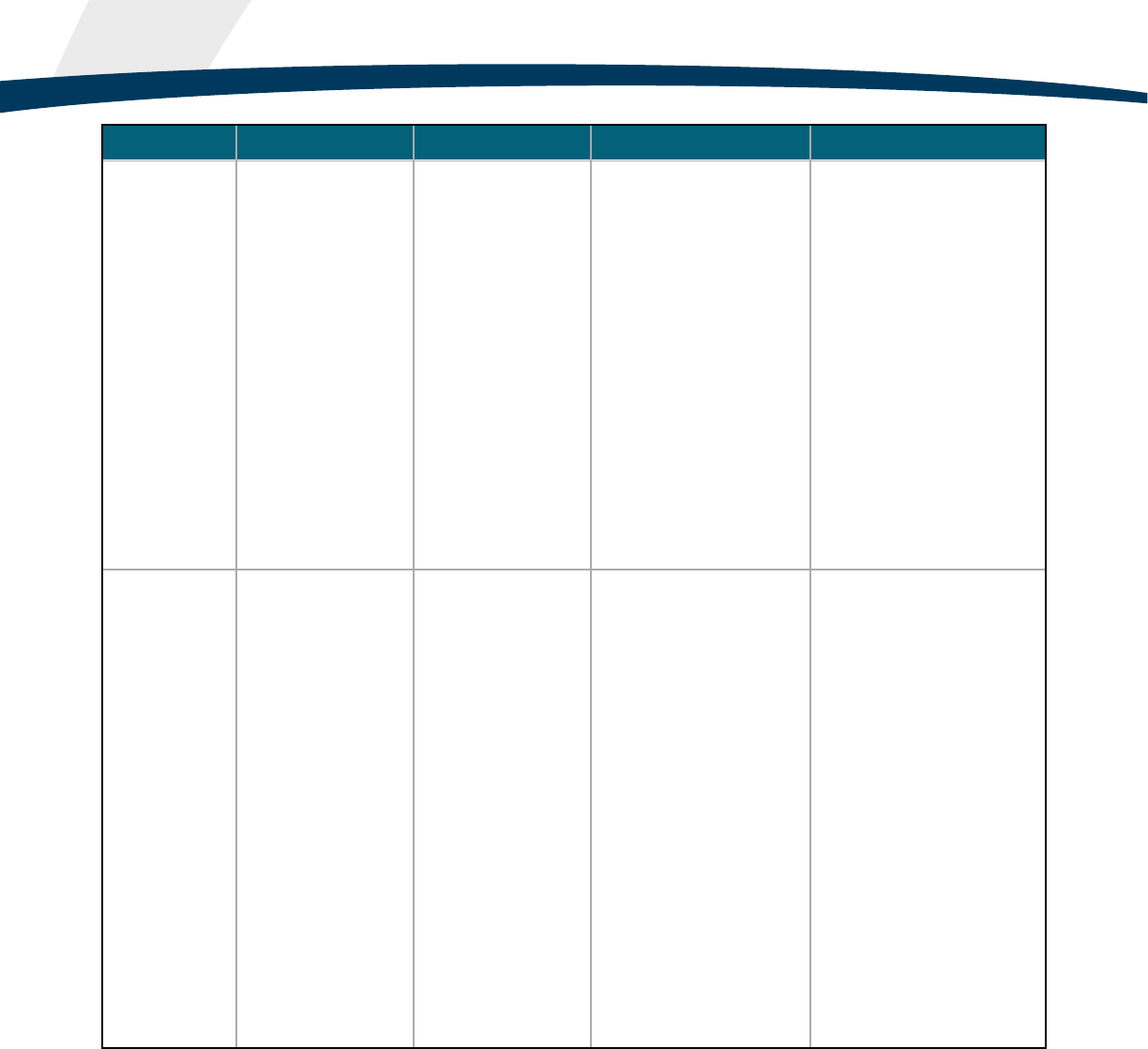
17
Iowa School Counseling Framework
ASCA Theme
Define
Deliver
Manage
Assess
Systemic
Change
School counselors
engage in efforts to
ensure students
have access to
coursework and
opportunities to
meet their
academic,
social/emotional,
and career goals.
School counselors
use the ASCA
Student Standards
to address systemic
issues and
advocate for policy
change.
School counselors
are change agents
in promoting
conditions which
support positive
student outcomes.
Cultural, social, and
environmental
influences on
student success
and opportunities
are carefully
considered.
The vision is delivered
through the school
counseling program.
Data is used to identify
barriers to student
success and
demonstrate a need for
change.
Analyzing results of
assessment helps create a
culture that promotes
systemic change.
Ethics
School counselors
are well-versed in
ASCA Ethical
Standards for
School Counselors
and they help guide
decision-making
within the school
counseling
program.
A comprehensive
school counseling
program ensures
equitable
development for all
the ASCA domain
areas and provides
opportunities for all
students.
The best available
research is
employed to drive
the school
counseling program
and ensure that it is
evidence-based.
School and student data
determine potential
needed interventions to
close information,
attainment, achievement
and opportunity gaps.
The school counseling
program’s goals and
action plans are aligned
with the school and
district school
improvement goals.
Advocacy for roles
appropriate for school
counselors ensures
maximum time and effort
toward positive student
outcomes.
Program assessments
help determine program
effectiveness and ensures
accountability.
When disparities exist
within student subgroup
outcome data, school
counselors prioritize
programs and activities to
help close the gap and
create systemic change.

18
Iowa School Counseling Framework
How Does a School Counseling Program Connect to
a Multi-Tiered System of Supports (MTSS)?
The ASCA positions statement on “School Counselors and Multi-Tiered System of Supports” provides
additional context and information connecting MTSS and a comprehensive, data driven school
counseling program.
Additional resources that may be helpful in connecting the school counselor’s role within a Multi-Tiered
System of Supports include:
The School Counselor’s Guide to Multi-Tiered Systems of
Support”
12
provides a basis of understanding for the connection
and alignment of MTSS and a school counseling program.
“Making MTSS Work,”
13
an ASCA resource, provides examples of
MTSS tier connections, sample forms, data usage and alignment
with a comprehensive school counseling program.
2019 ASCA National Model
14
Aligned with MTSS is based on the
Goodman-Scott, Betters-Bubon & Donohue, “Professional School
Counseling, (2016) and the 2019 ASCA National Model.
The School Counselor’s Role in Multi-Tiered Systems of Support
resource is provided by School Counselors 4 MTSS
.
12
Goodman-Scott, E., Betters-Bubon, J., & Donohue, P. (Eds.). (2019). A school counselor’s guide to Multi-tiered
Systems of Support (1st ed.). New York City, NY: Routledge
13
Goodman-Scott, E., Betters-Bubon, J., Olsen, J., & Donohue, P. (2020). Making MTSS Work. American School
Counselor Association
14
American School Counselor Association. (2019). The ASCA national model: A framework for school counseling
programs (4th ed.). Alexandria, VA: Author.
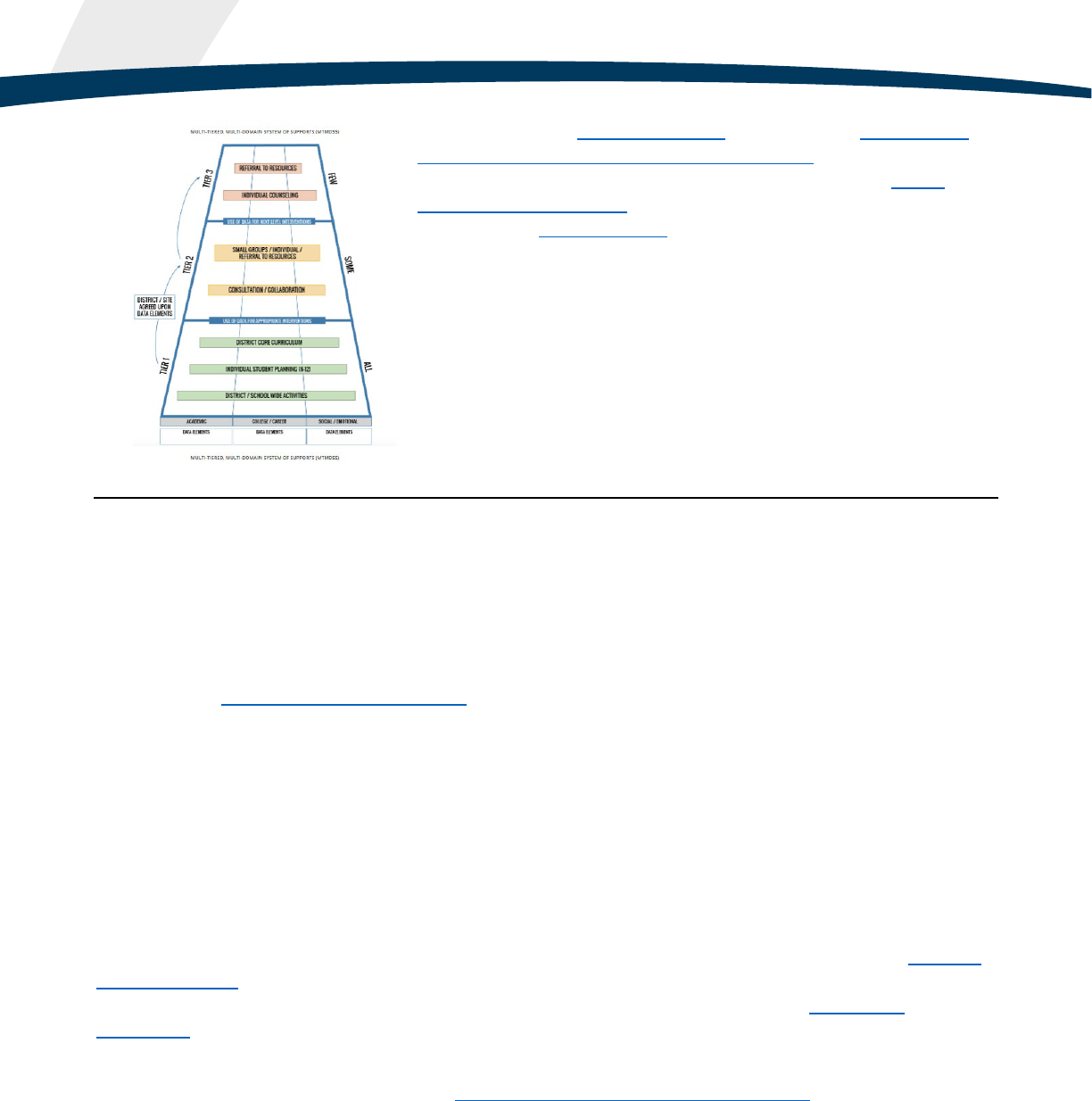
19
Iowa School Counseling Framework
Dr. Trish Hatch of Hatching Results developed the Multi-Tiered,
Multi-Domain System of Supports (MTMDSS), which incorporates
the three domains of school counseling outlined in the ASCA
Mindsets and Behaviors within the multi-tiered system of support
framework. A video resource provides additional clarification of
MTMDSS.
How is the ASCA Model Implemented?
Implementation of the ASCA Model can be somewhat overwhelming for new school counselors or for
school counselors who may be building school counseling programs from the ground up. However, the
process is made much more manageable by breaking it into parts and implementing in steps. ASCA
has created a phased implementation plan
that walks school counselors through the four phases of
implementation. The length of time for each phase can vary based on experience, support, and amount
of time available to commit to the work.
What is RAMP?
RAMP stands for Recognized ASCA Model Program and is a recognition for schools that are delivering
an exemplary school counseling program aligned with the ASCA National Model Framework. Schools
need at least one academic year to collect the data and information needed to apply for RAMP; the
application is due annually in October. If a school meets criteria for RAMP, the designation lasts for five
years.
To determine if the school is ready to apply for RAMP, the first step would be to complete the
program
assessment tool to determine if your program incorporates all components of the ASCA Model and is
data informed. If your program is ready to RAMP, ASCA has created a suggested timeline for
application and it is helpful to review the RAMP Rubric as well.
RAMP designation, as well as alignment with the ASCA National Model, is associated with better
outcomes for students. Examples of how RAMP designees addressed equity gaps
using the ASCA
Model have also been created to aid in the RAMP process.
